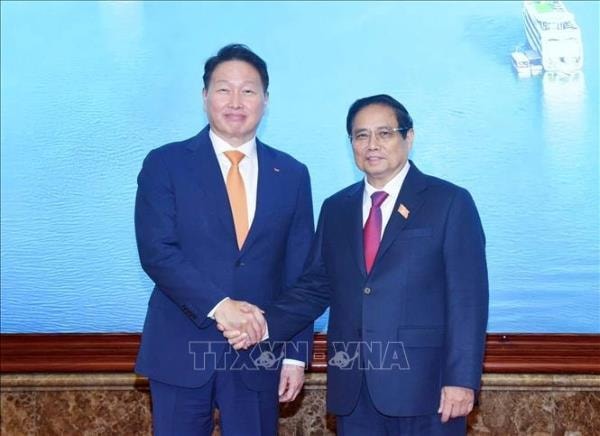New strategies of South Korean big techs in Vietnam
Vietnam has emerged as a strategic “playground” for major Korean tech giants like SK Group, Samsung, and others.

Prime Minister Pham Minh Chinh meets with Mr. Chey Tae-won, Chairman of SK Group and President of the Korea Chamber of Commerce and Industry (KCCI). Photo: VNA.
The “New Appetite” of South Korean Investors
With FDI totaling $7.06 billion in 2024—a 37.5% increase from the previous year—South Korea was the second-largest investor in Vietnam. Notably, big firms like Samsung and SK Group are changing their approaches and moving into billion-dollar initiatives that emphasize technical advancements and sustainability.
With a $200 billion market valuation, SK Group is stepping up its energy-related collaboration with Vietnam. Chairman Chey Tae-won recently presented plans to construct large-scale LNG power plants, as well as AI data centers, hydrogen energy projects, and small modular nuclear reactors (SMRs) in discussions with Prime Minister Pham Minh Chinh and General Secretary To Lam.
SMR technology is compact, safe, and flexible, expected to provide stable power for industrial zones and urban areas while reducing CO2 emissions.
Beyond energy, SK Group also plans to invest in eco-friendly agriculture and AI-integrated logistics. A notable example is its $3.5 billion investment in biodegradable material production in Vietnam, supporting companies like Vingroup, Masan, and Pharmacity.
Additionally, SK Group aims to strengthen collaboration with Vietnam’s National Innovation Center (NIC) to foster talent training and research in emerging technologies—further emphasizing its shift towards a green and sustainable future.
Previously, Samsung, the largest FDI investor in Vietnam with $23.2 billion, also announced expansion into semiconductors and AI. In 2023, the conglomerate began semiconductor component production in Vietnam, marking a significant step in its global supply chain. By 2024, Samsung Display pledged an additional $1.8 billion investment in its OLED display plant in Bac Ninh, bringing its total investment there to $8.3 billion.
Mr. Choi Joo Ho, CEO of Samsung Vietnam, affirmed in a meeting with Prime Minister Pham Minh Chinh: “Vietnam is an irreplaceable manufacturing and research hub, especially in the context of global supply chain diversification.”
Policy as a Key Driver
The strong presence of South Korean conglomerates like SK Group and Samsung in Vietnam is no coincidence. With a dynamic economy, a young population, and a growing consumer market, Vietnam has become an attractive destination for foreign investors. Moreover, economic reforms, improved governance, and a more investor-friendly environment have solidified business confidence.

The investment “appetite” of South Korean businesses in Vietnam has undergone significant changes.
According to the Ministry of Industry and Trade, bilateral trade between South Korea and Vietnam reached $86.7 billion in 2024, up 9.2% from the previous year. Vietnam is now South Korea’s third-largest trading partner, following China and the United States. The goal of reaching $100 billion in trade by 2025 and $150 billion by 2030 highlights Vietnam’s significance to South Korean investors.
Actually, through funding programs for the semiconductor and artificial intelligence industries, tax breaks, and R&D assistance, Vietnam is actively improving its investment climate. For example, Decree 182/2024 offers companies a 50% grant for research expenses in several fields. Additionally, investors are showing interest in large infrastructure projects, including a national data center, major seaports, and the North-South high-speed train.
Mr. Hong Sun, Honorary Chairman of KOCHAM, stated: “Vietnam’s strategic location, young workforce, and open policies are key factors for South Korea’s growing presence.”
However, despite these positive prospects, South Korean firms remain concerned about complex administrative procedures and power shortages. Chairman Chey Tae-won recently urged the government to expedite project approvals and ensure stable electricity supply for high-tech factories. Furthermore, Vietnam is not the only destination for semiconductor and clean energy projects, as the U.S., Japan, and the EU are also actively competing for FDI in these industries. To maintain its advantage, Vietnam must accelerate institutional reforms and develop a high-quality workforce.
Overall, the shifting investment priorities of South Korean giants reflect a global trend—moving away from low-cost manufacturing towards green technology and sustainable supply chains. With strong commitments from both sides, Vietnam-South Korea cooperation is heading toward the ambitious $150 billion trade target by 2030. However, success will depend on Vietnam’s ability to improve infrastructure, talent development, and regulatory transparency. As Mr. Hong Sun aptly noted: “Reform must never stop; it is the key to retaining top investors like SK and Samsung.”
Source: en.dddn




